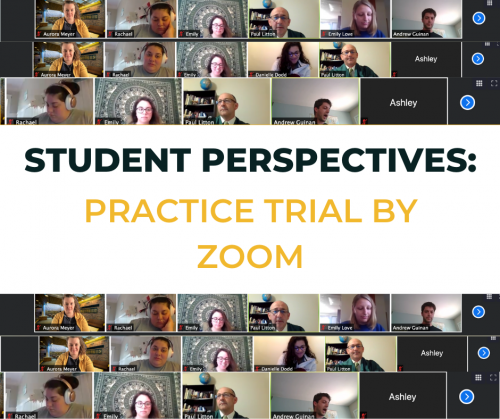
With the abrupt transition to online learning, our professors and students have had to be inventive with their engagements. Associate Dean Paul Litton teaches criminal law, and to keep things interesting, he hosted a practice trial by Zoom for his students last week. He even changed into a Rockbridge green robe, which reflected the graduates of the jurisdiction. Below is what we heard from students about their experience with this exercise.
Niya Young:
The mini-trial on Wednesday via zoom was very helpful and fun, and I hope that it becomes a weekly feature to our online edition of criminal law. The transition to online law school has been especially difficult for me because I struggle to find motivation at home. It’s easy for me to think that I’m on a break because I do not (and cannot) leave my apartment. To stay engaged with material and learning, I try to switch up the environment/atmosphere that I complete my work in as much as possible. Because I cannot go anywhere, I alternate between my bedroom, living room, and deck outside if it’s nice. COVID-19 has, of course, caused many problems for people all around the world, but knowing that I would never get to sit through another in-person criminal law class definitely hurt. Criminal law is the reason I came to law school, and I anxiously waited all last semester to take this class. Our discussions and conversations in criminal law are a lot more controversial and deep than any of our other core classes. In this class, we sometimes get to take a step away from the textbooks and law and look at the material in the context of the real world. The zoom trial that we did on Wednesday allowed us as a class to open those discussions back up, and review material and cases at the same time. This exercise was also very helpful for me because, as a participant and jurist, I had the opportunity to see how other people think, and most importantly, I got a chance to see how I think. Because the 1Ls this year cannot compete in the annual moot court, exercises like this give us a look and experience in the courtroom. In all, Wednesday’s trial was the highlight of my online version of law school thus far.
Grace Hambuchen:
Trial by Zoom? Law school online has forced professors and students to get creative, really creative. One idea Dean Litton has used to stabilize and encourage our understanding of criminal law is through mini-trials. It is one thing to read a case, but it is another actually to participate in the determination of guilty or not guilty. I was able to sit (or zoom) as a juror. Two students gave closing arguments, then the jury deliberated. I enjoyed this activity because it gave us the opportunity to observe the law in action. We were able to experience the two sides of the story and apply the elements we learned to the facts. The added discussion-based activities Zoom allows in our learning helps solve the social isolation problem online classes create.
Cade Jones:
I thought our mini-trial yesterday over the controversial issue of sexual assault was very engaging, considering it was done virtually. As an observer, it was intriguing for me to view the arguments presented by the prosecution and defense but also to get the viewpoints from the juror/fellow colleagues on how they interpreted the arguments made by both parties. By also adding in my own views as an observer during the discussion, I believe doing this type of exercise of a mini-trial on a deep issue in criminal law facilitates good discussion between all of my fellow colleges towards staying engaged in the material over these unprecedented times our world is going through.